Introduction
Embarking on a dieting journey is more than just a quest for weight loss; it's a transformative process that begins with understanding personal motivations. By identifying what drives the desire for change—whether it's improving health, boosting self-esteem, or preparing for a life event—individuals can set clearer, more attainable goals.
Research highlights the significance of these intrinsic and extrinsic motivations, revealing that a strong foundation leads to greater success in weight management. As the journey unfolds, effective strategies such as:
- Meal prepping
- Embracing social support
- Cultivating resilience through self-compassion
become essential tools. This article delves into the multifaceted aspects of dieting, offering insights and actionable steps to empower individuals in their pursuit of wellness. By fostering a mindset that prioritizes well-being and celebrates progress, anyone can navigate the challenges of dieting with confidence and determination.
Identifying Your Personal Motivation for Dieting
Begin by articulating your motivation to diet and the reasons for wanting to embark on this dieting journey. Are you looking to improve your overall wellness, boost your self-esteem, or get ready for an important event in your life? By distinguishing between intrinsic motivations—such as the desire for better health and increased confidence—and extrinsic motivations, which may include social approval or physical appearance, you can gain clarity on your objectives.
Research indicates that understanding these motivational drivers is crucial for effective weight management and can significantly influence a person's motivation to diet. Notably, studies show that 86% of interventions based on Self-Determination Theory (SDT) yielded significant improvements in exercise-related behaviors. This statistic underscores the importance of recognizing and harnessing your motivation to diet.
Additionally, consider the findings from a case study on gender differences in exercise regulations, which suggested that introjected regulation positively influenced exercise among females, while males showed either negative or no associations. This highlights how different motivations can affect various demographics, a consideration that HR Benefits Managers should keep in mind when addressing employee wellness. Foresight Health Coaching stands ready to support your journey with tailored programs that include fitness coaching, nutritional guidance, and wellness workshops designed for individuals and corporate groups alike.
To reinforce your commitment, consider writing down your motivation to diet and placing it in a visible location. This practice acts as a regular reminder of your objectives, fostering a sense of accountability and dedication. As noted by Almutairi et al., respondents identified significant barriers to executing obesity prevention interventions, including curriculum-related challenges and a lack of specialized teachers.
Recognizing these obstacles can further enhance your approach to dieting. Remember, the path to successful dieting relies not just on the end result; it involves nurturing a mindset that prioritizes your well-being and emphasizes the motivation to diet. For more information on how to access our services, including our app and personalized coaching options, please contact us directly.
Let's work together to craft a wellness plan that truly suits your needs. Contact us today to learn more about our tailored programs!
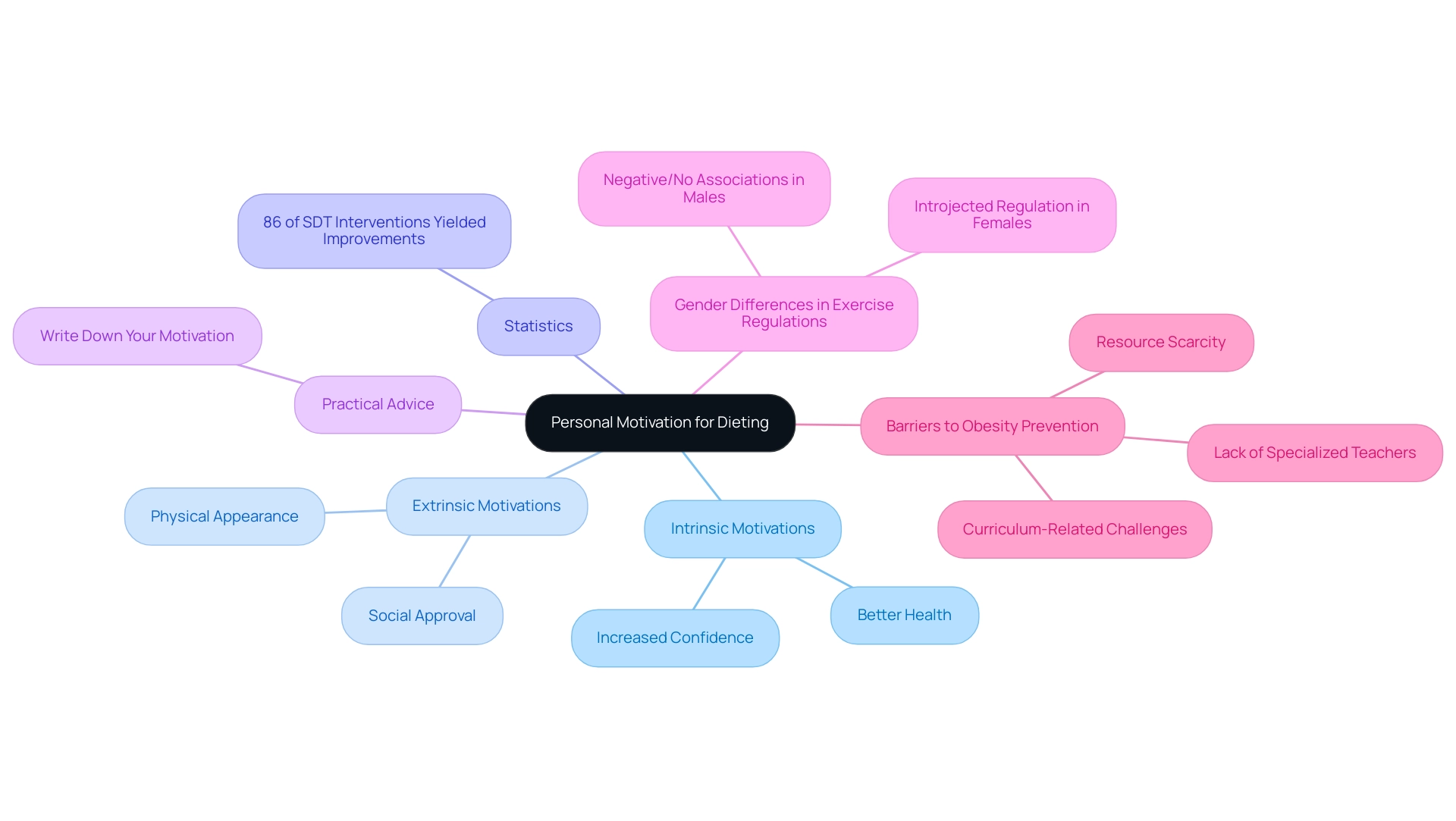
Effective Strategies to Stay Committed to Your Diet
To maintain your commitment to effective body management, embrace the powerful strategy of meal prepping. By planning your meals for the week and preparing healthy snacks in advance, you can significantly reduce decision fatigue and make healthier choices easier. In fact, those consuming home-cooked meals more than five times per week are 24% less likely to have excess body fat, underscoring the importance of meal preparation in achieving weight management objectives.
Monitoring your food intake and progress through our comprehensive coaching app not only keeps you accountable but also offers insights into your dietary habits with features like:
- Direct messaging to your coach for personalized support
- Access to the accountability and data hub for tracking your progress
Recent studies, including the Fenland study, highlight the strengths of comprehensive data collection methods and objective measurements in understanding dietary impacts, although they also note limitations such as potential biases in self-reported data. Setting reminders for your goals within the app can keep your mindset focused, while creating a visual representation of your journey, such as a vision board, can ignite your motivation daily.
As Brittany Modell, a registered dietitian, aptly puts it, 'Meal prepping and making the decision to eat balanced meals leaves room for flexibility while also encouraging you to eat food that makes you feel good mentally and physically.' Regularly reassessing your strategies and adjusting them as needed will ensure that your routine remains fresh and engaging. With our app, you can also access bi-weekly group calls and a built-in community feature that connects you with like-minded individuals for added motivation.
This holistic method, backed by our health coaching application, prepares you for long-term success in your management journey. DOWNLOAD & GET STARTED.
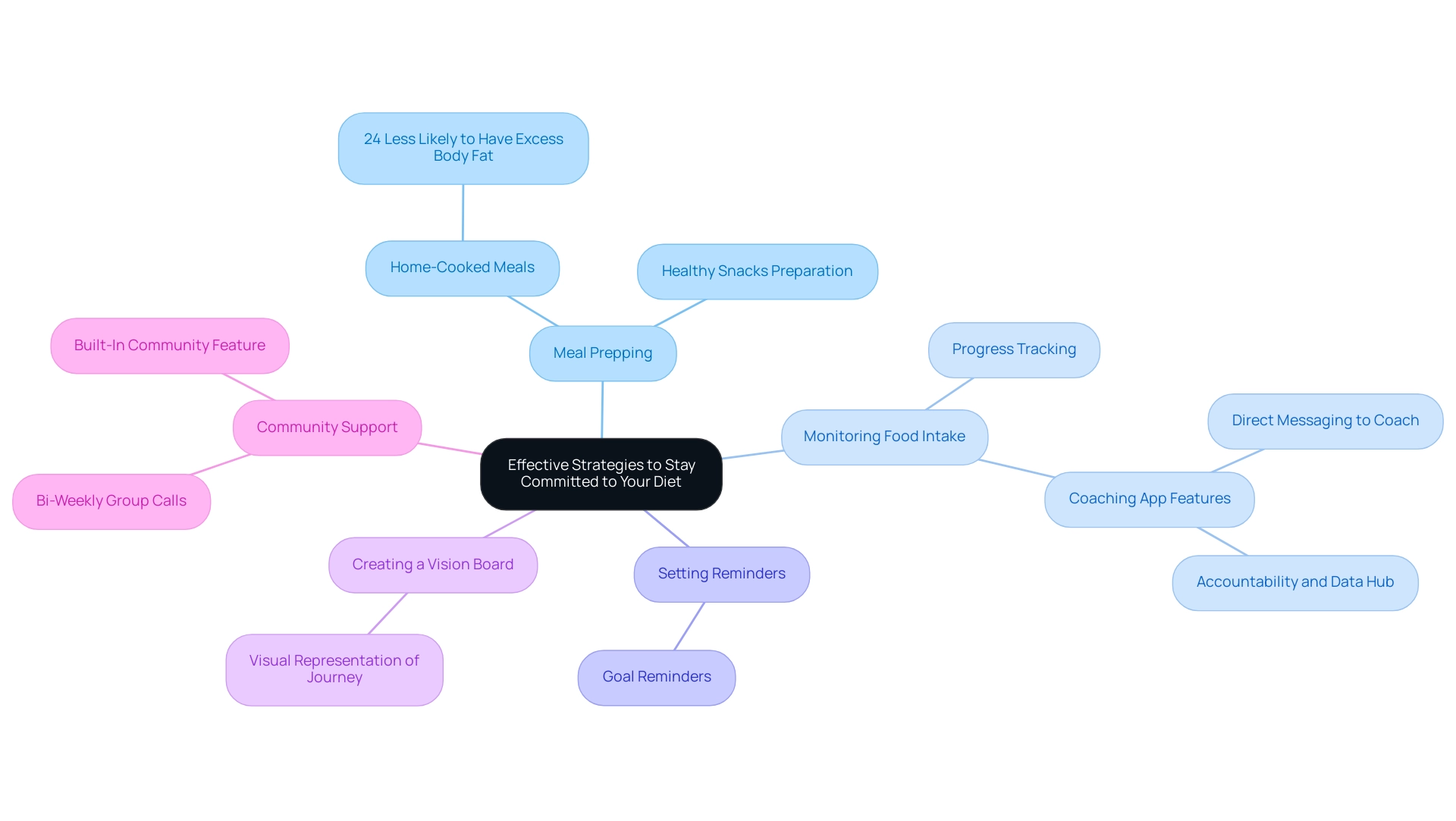
Overcoming Psychological Barriers to Weight Loss
Setbacks are an inherent part of the dieting journey, and recognizing this can enhance one's motivation to diet for sustainable weight management. Embracing self-compassion is critical; speak to yourself with kindness when challenges arise. As highlighted by experts, personalized support and experienced coaching can significantly enhance your journey, helping you make lasting lifestyle changes.
Evidence-based practices reinforce the importance of structured strategies in achieving health goals. For instance, studies show that the mean percentage of total body weight loss achieved after nine months is 16.9%, underscoring the effectiveness of these approaches. Employing mindfulness techniques can significantly aid in managing cravings and emotional eating, allowing individuals to focus on the present moment rather than succumbing to negative thoughts.
Journaling your feelings can serve as an effective tool for identifying triggers and enhancing self-awareness. Furthermore, given that over 60% of women in the UK experience dissatisfaction with their bodies—a common psychological barrier—it's essential to seek professional help when needed. A therapist or dietitian can provide tailored strategies that directly address these obstacles.
Research indicates that psychological follow-up significantly enhances adherence to nutritional programs in individuals with obesity, underscoring the necessity of assistance. Additionally, case studies have identified barriers to obesity prevention, such as resource scarcity, while capable staff and supportive regulations act as facilitators. Integrating self-compassion and mindfulness into your approach not only fosters resilience but also enhances your motivation to diet, paving the way for a healthier relationship with food.
As one of our clients, Sarah, shared, "With the personalized coaching I received, I learned to embrace setbacks and focus on my progress, which transformed my approach to well-being."
Let’s discuss how we can help you thrive in the modern world while learning from the wisdom of the past. Reach out to us today to discover how tailored assistance can enhance your wellness journey!
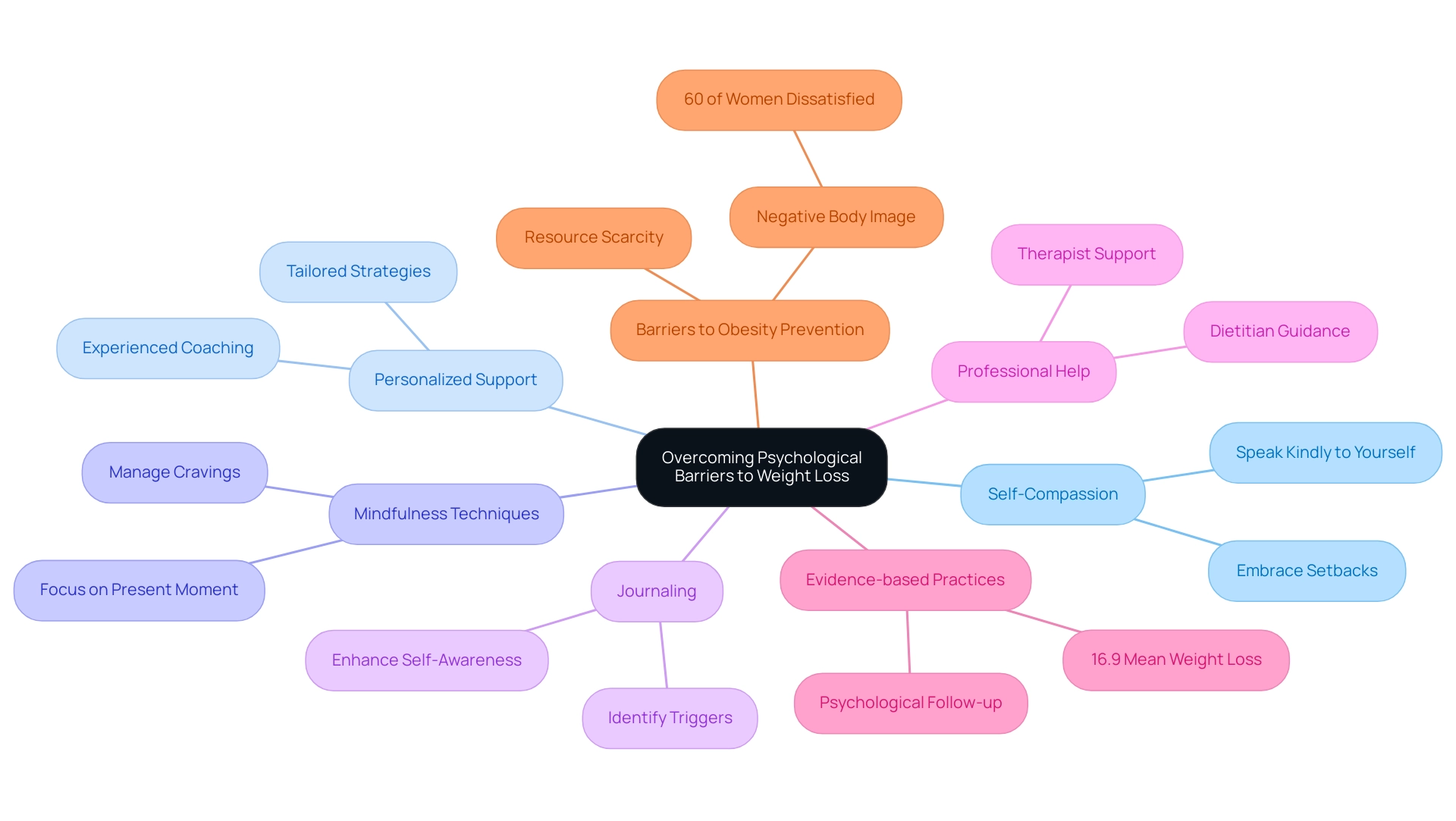
The Power of Social Support in Dieting
Connecting with friends, family, and colleagues who share similar health goals can be a game-changer for your management journey. Engaging in a supportive community—whether through local groups or online platforms dedicated to healthy living—can enhance your motivation and accountability. A recent study emphasized that social assistance is crucial for weight control, revealing that encouragement from friends and coworkers leads to slight weight reduction at 24 months.
As noted by Davidson et al.,
Peer assistance is regarded as a critical factor in helping individuals recover from mental illness, illustrating the broader benefits of communal aid. Regularly checking in with your support network allows you to share your triumphs and challenges, fostering a sense of belonging and camaraderie. Celebrating each other’s successes not only boosts morale but also strengthens the commitment to your health goals.
Effective strategies, such as participating in regular exercise and embracing a 'fresh-slate mentality,' have shown success in sustaining loss, as emphasized in the case study 'Strategies for Successful Maintenance.' Women who adopted this mindset could overcome setbacks with resilience, showing that community assistance is not merely advantageous—it’s vital for long-term success in managing their health. Additionally, Tamers et al. examined the influence of colleague social support in encouraging modifications in obesogenic behaviors, further highlighting the significance of community involvement in attaining health management objectives.
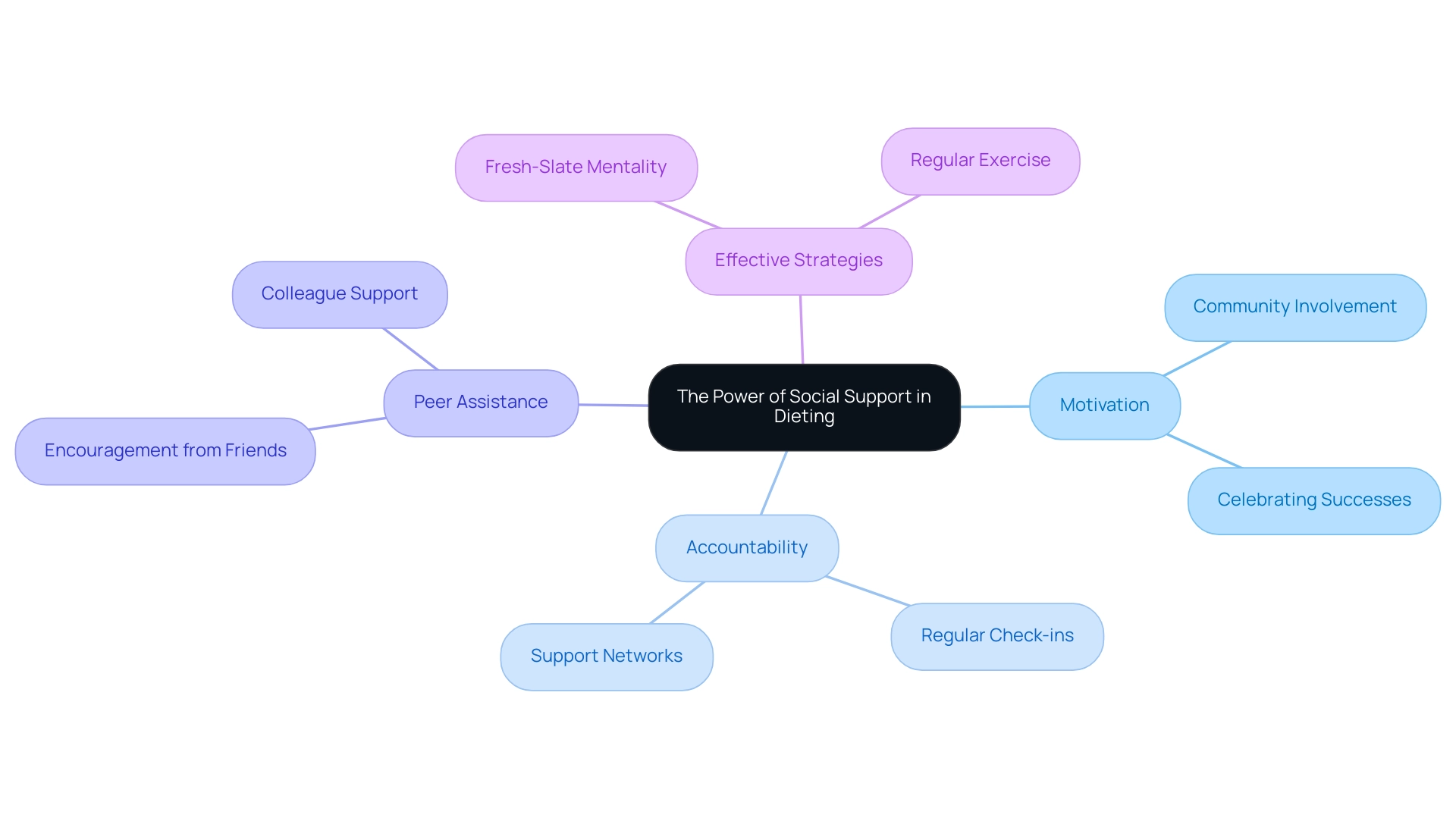
Setting Realistic Goals and Celebrating Progress
To effectively harness motivation to diet in managing body composition, it is essential to establish SMART goals—Specific, Measurable, Achievable, Relevant, and Time-bound. Research suggests that individuals who establish clear objectives are 10 times more likely to accomplish them than those who do not. For instance, instead of aiming to lose 20 pounds in a month, focus on a realistic target of losing 1 to 2 pounds each week.
This approach not only enhances your likelihood of success but also builds confidence. A case study demonstrated that participants who received reminders about their goals showed higher engagement and adherence, illustrating the effectiveness of structured support in achieving weight loss objectives. At Foresight Health Coaching, we provide customized programs for individuals and corporations, including:
- Personalized fitness coaching
- Wellness coaching
- Nutritional guidance
- Wellness workshops delivered through our app
Our corporate memberships encompass extensive pantry and nutrition services, in-person wellness discussions, and access to our wellness app, fostering a supportive environment for employees. As you progress, celebrate milestones with non-food-related rewards, such as a relaxing spa day or a stylish new workout outfit. Recording your journey and contemplating each accomplishment is essential; it helps maintain your motivation to diet and dedication to your long-term objectives.
Additionally, sign up for our free 7-day trial to experience the transformative power of our health coaching app and support your team's wellness goals. Embrace each step as a victory, reinforcing the belief that progress, no matter how small, deserves recognition and celebration.
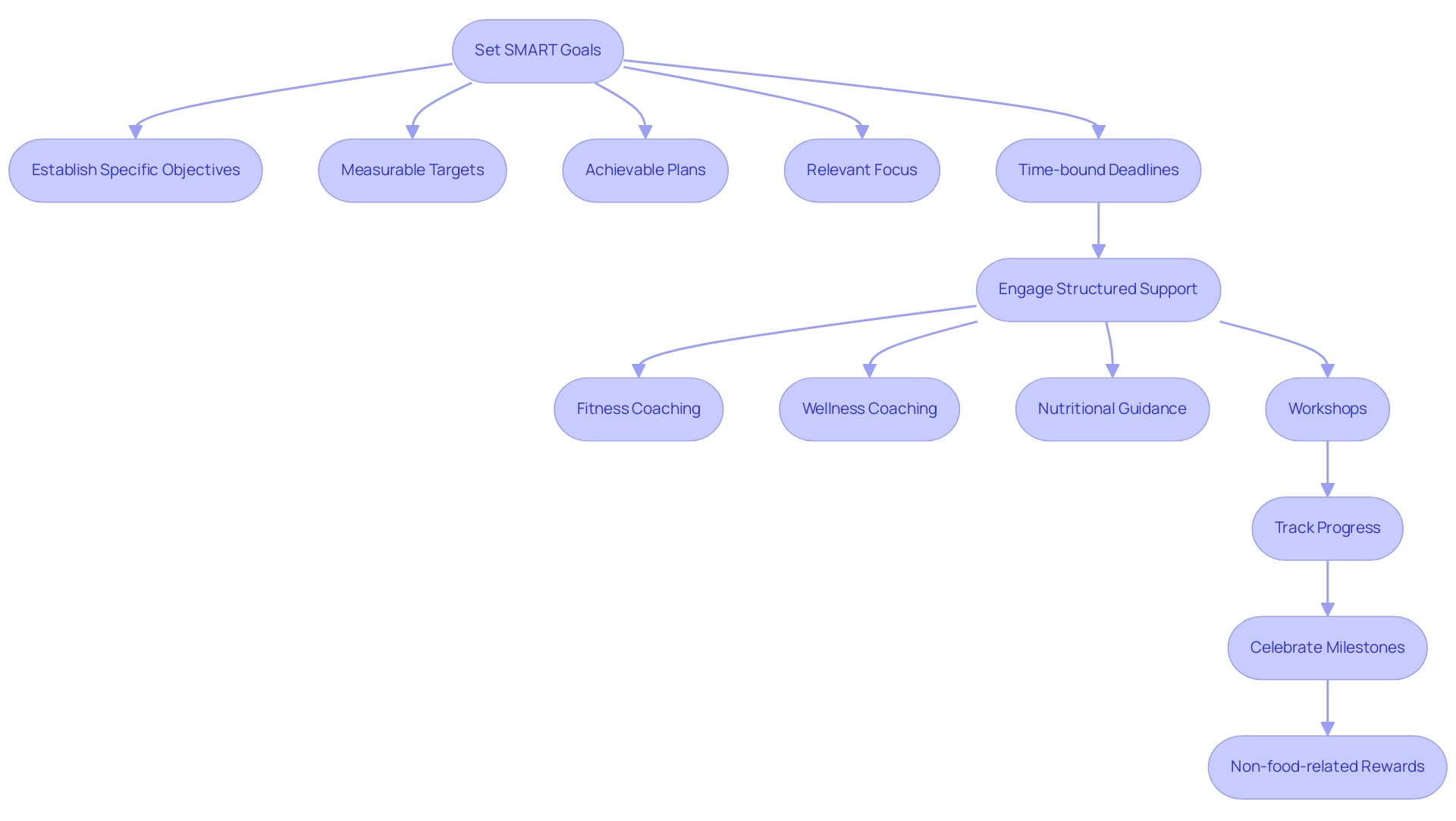
Conclusion
Embarking on a dieting journey is a profound and transformative experience that goes beyond mere weight loss. It begins with identifying personal motivations, whether they stem from a desire for better health, increased self-esteem, or preparation for significant life events. Understanding these intrinsic and extrinsic drivers is crucial, as research illustrates their impact on effective weight management. By fostering a mindset that prioritizes well-being and recognizing the transformative power of motivation, individuals can set themselves up for success.
Implementing effective strategies such as:
- Meal prepping
- Embracing social support
- Cultivating resilience through self-compassion
are essential tools in this journey. Meal prepping not only simplifies choices but also enhances the likelihood of maintaining a healthy diet. Meanwhile, connecting with a supportive community can provide the encouragement needed to stay committed, as shared goals and celebrations of progress foster accountability and motivation.
Overcoming psychological barriers is equally important; embracing self-compassion and mindfulness can create a healthier relationship with food and enhance resilience in the face of setbacks. Setting realistic, achievable goals further empowers individuals, allowing them to celebrate milestones along the way.
Ultimately, the path to successful dieting is one of growth and self-discovery. By integrating these strategies and insights, individuals can navigate the challenges of dieting with confidence and determination, transforming their health journey into a sustainable lifestyle change. Prioritizing wellness and celebrating each step fosters not only personal success but also a thriving community dedicated to achieving their health goals together.




